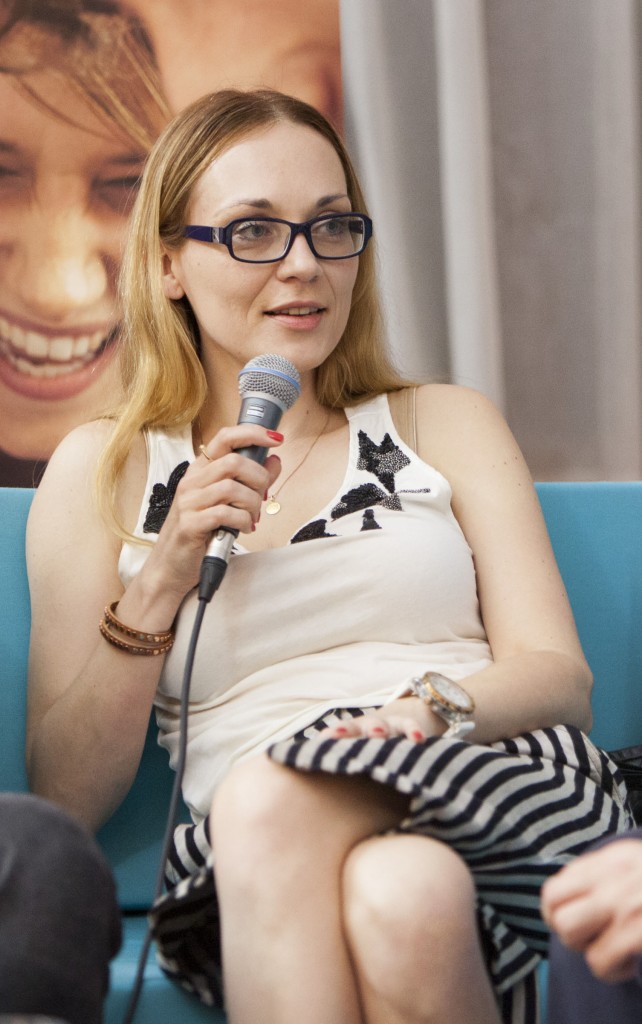Sunday | 20. July. 2014
PULA CONVERSATIONS: Jasna Nanut
 Jasna Nanut, director and screenwriter of the short film The Clean-Up
Jasna Nanut, director and screenwriter of the short film The Clean-Up
The author on The Clean-Up.
The film talks about domination between a man and a woman, a clerk and a cleaning lady. They say that if you want to test a person’s personality, give him some power. The greater the power, the more dangerous its misuse. The film plays with the idea of how to resist power, how to survive its sudden rush.
What was the idea that lit the film?
I had for long thought about the idea of a man who stays late in the office and whose attention is drawn by a cleaning lady who finds herself there by accident. That should be a common office situation but there is something appealing in a woman who is vacuuming and dusting, especially if it is already dark and the two of them are left alone in a big empty building… And then we got ‘The Encounter’, a story by Polish author and playwright Slawomir Mrožek, as an assignment at the fourth year of the film directing programme at the Academy. As the text is bordering with absurdity, something that I don’t find particularly appealing, I was struggling with the adaptation until I took some advice from Zvonimir Jurić, my mentor on my previous film Together whom I hold in high esteem. He helped me fit my personal affinities in the assignment and the result was a freer interpretation of Moržek’s story.
Where did you shoot the film?
Around Valentine’s Day, in the so-called Kockica (Dice), two days. These where night shootings. It was perfectly quiet thanks to the Ministry of Maritime Affairs, Transport and Infrastructure that is located there and whose Secretariat-General told us: ‘The building is yours as much as it is ours.’ The beautiful interior of the building designed by architect Ivan Vitrić that still looks like in the sixties, when it was constructed, gives out the retro atmosphere that is reflected on the film. We placed the make-up and dressing room in the grand conference room that was long time ago the venue for the meetings of the Central Committee of the League of Communists of Croatia. We were surrounded by the magnificent works by Murtić, Goldoni, Prica, Jagoda Buić, etc. That is the reason we picked that location. I wanted this story to have a retro look, as if it could have happened anywhere, anytime. I am very pleased with the photography achieved by DOP Tomislav Sutlar and colourist Tomislav Stojanović , which reminds a lot of my favourite films from the seventies in terms of its texture.
What have you learned making The Clean-Up?
That Dado Ćosić is an incredible talent! He was born to be an actor. Intelligent, measured, precise, capable of bringing out a subtly dosed perversion. We got along so well that right after The Clean-Up we thought of a story for our next film, Fists, that is currently being edited and in which Dado takes the lead role. I was just as fascinated by Urša Raukar for her honest and open approach to work, her dedication and talent. She is an exquisite actress and a wonderful woman. I can’t wait for us to work together again. There is nothing better that finding yourself on the same wavelength with the actors.
To what extent has your fifteen-year-long work for different televisions, mostly in entertainment programmes and programmes not close to feature film, helped you come to grips with film directing which you started studying in mid-nineties?
I still work on television, as a freelance screenwriter. Being in front of the camera helped me better understand how actors feel. Working on television is similar to working on film in terms of production, but when it comes to directing, what helped me most is my life experience. The older you are, the better you understand yourself, the world around you and human nature.
One room, two actors, discussion on their relationship – an already quite standard model for a Croatian short film in the last couple of years but still an inexhaustible backdrop for a series of interesting variations.In this case – an office, a hall, a toilet and the space in front of the building, but there are no rules. My best short film of all times is Roman Polanski’s Two Men and a Wardrobe, completely deprived of dialogue. Our authors very often decide to have two actors and one space because of a limited budget, which very often turns to be an advantage because you can polish a seemingly simple situation to perfection, unburdened by the requirements of a more complex production. Being isolated in Kockica all of us felt great. As if there had been nothing else but us and the film we were making. I assume that is how one feels making a film in a large studio, in controlled conditions.
Short film as a form – school, a step towards feature-length film, a challenge, a valid and valuable form that has to be cherished and that provides specific possibilities and results?
The last thing you mentioned, first of all. A short film is an exercise for a feature-length film, definitely, but it is also an appealing form with its own specific rules. I am thankful to the Academy for enabling us students to learn our trade through exercises that are in fact short films. We meet our colleagues and we experiment under the mentorship of a screenwriter and film director whose experience and advice, of course, we find very useful. My mentor on The Clean-Up was Lukas Nola who has made so many films that he can give you the answer to any question you can come up with, because he has been through all that. When filming finishes, my permanent art director Denis Rubinić always asks me my favourite question: ‘When are we shooting again?’ And then we sigh: ‘Ah… Too bad this wasn’t a feature-length film…’ Not because short films were less valuable, but because filmmaking gives you so much adrenalin that you wish it could last forever.


